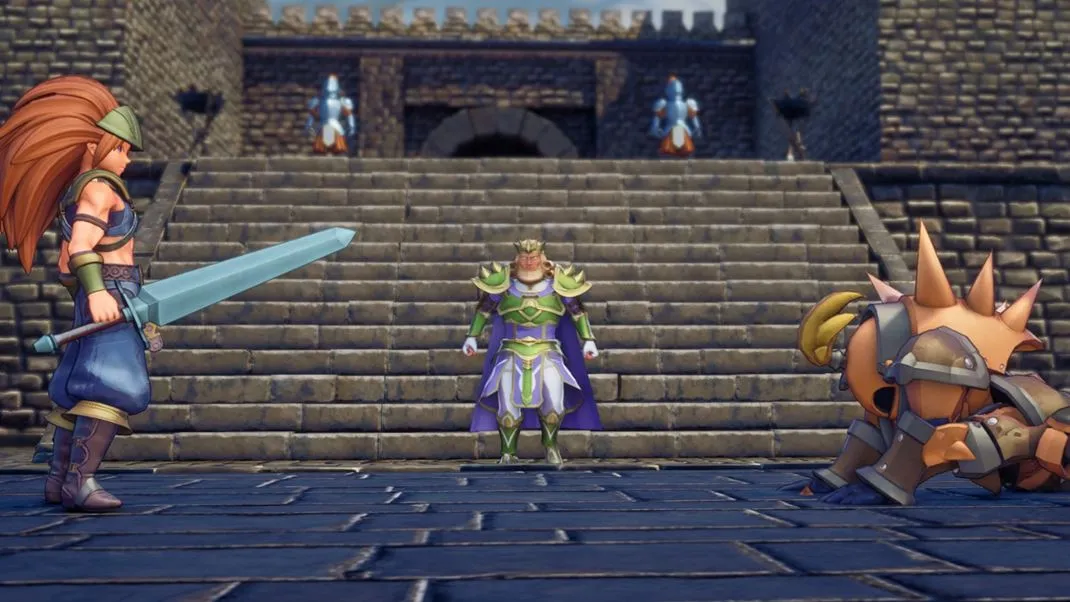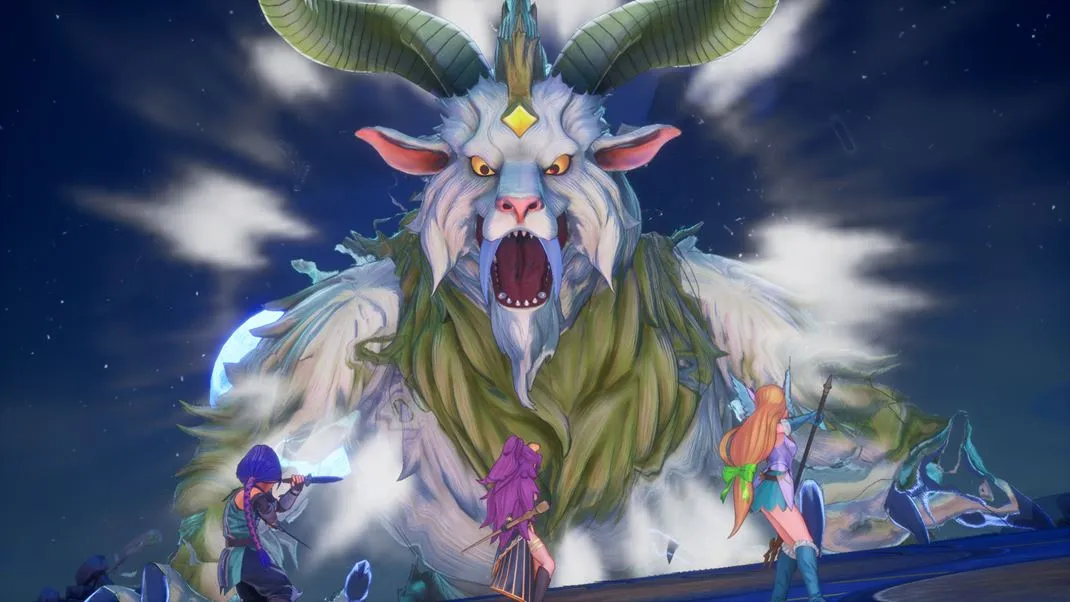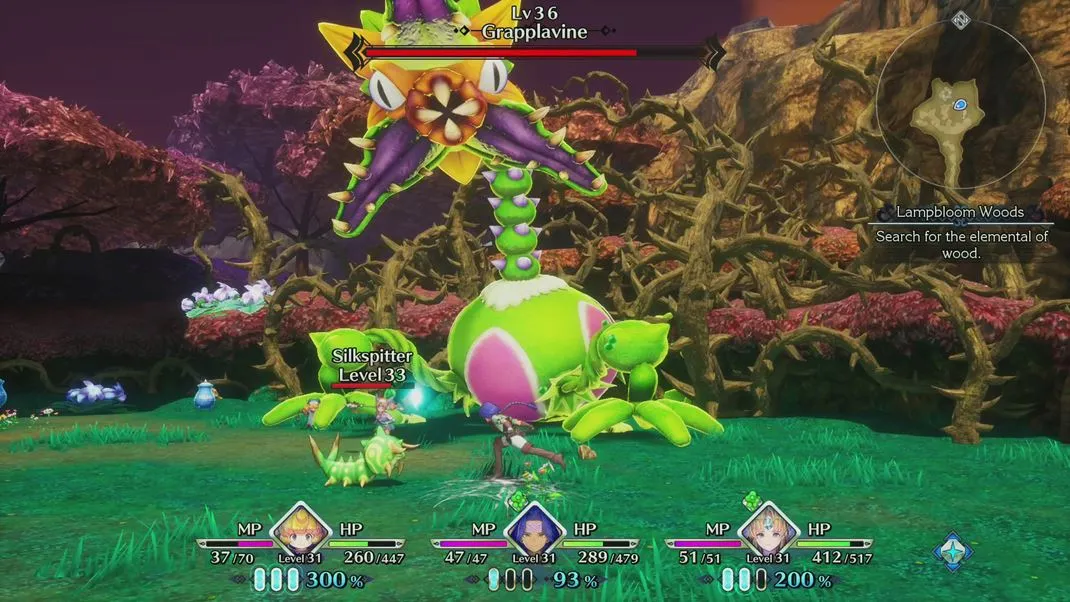If you happened to play another dusty game from the saga (Secrets of Mana), you might say that it is not worth trying a novelty, because the part had a relatively simple port to new platforms, did not look very good and was quite boring in places. But Trials of Mana is a more modern game and at least feel it in terms of controls and graphics: it doesn't deter you from playing anymore, but rather entices you to stay an hour longer, watch a few scenes, peek into a maze, go through a few fights and burn forward. By the way, the game has a pretty generous demo (about 4-5 hours) and the saved position can be taken to the full version.
Like the other games in the series, the story revolves around the legendary mana that gives the world life and a magical tree, and although it starts out as a very mystical thing, it runs in a different direction. The authors also experiment with several prologues and the selection of a group of heroes, which is quite crucial for the series and RPG. In the beginning, Trials of Mana will allow you to take the main character and two others. There are six of them in the repertoire, but you only take three, with whom you complete the whole journey. This is a different step compared to other RPGs, where you gradually get to all the characters, learn their story and eventually take them into battle.
Trials of Mana have a choice of two physical warriors, two magical, a healer and a thief. It's up to you how you want to put together the first game - the game probably expects you to complete the game at least twice (always with a different three) or more times (if you choose the combo physical-magical-other member). From the first minutes, however, you must properly consider what the game will look like, because the way back is impossible. This is partly a controversial step, because if you find that the composition is not ideal, you either have to grind or try different combinations with the three. In the worst case, you will say that you need to restart the game.

Fortunately, my RPG intuition whispered to me that the combination of puncher Kevin, healer Charlotte and expert on ranged attacks with magic Angela could work, and for 30 hours this trio has been able to stand out as capable and resilient even in the toughest fights. This is also due to my conservative style, where physical attack and good support from the healer form a good foundation and it is questionable who and how to complement it - a strong witch is often a good choice, she just needs to be adequately protected in combat.
Your choice of three characters also affects other aspects of the game. The first are the prologues that you complete similarly to the RPG Octopath Traveler - you will treat yourself to an introduction to your main character and when you meet the second or third character, you have a chance to discover its motivations and story background. Another aspect is the variety of bosses - due to the story of the story, the characters have three main enemies, always two characters share their nemesis. (So theoretically, if you choose a three, you can face all three, but at least two.) Finally, if you want to experience a romance, it's available for one couple, so you can, but don't have to, hit it the first time you play it. This is true for many other scenes, and here it is clear that the game is not just one pass, but all the elements and New Game + will invite you to other quests.
The crucial question is whether the game is good enough for you to finish it at least once. Unlike other RPGs, it has a fragmented narrative, you won't enjoy all the characters in one go and you won't discover all the lines it offers. But it doesn't matter at all, although RPGs are known for their rich story, where at least half a dozen characters appear at once, you get them here gradually. And the episodes with the other trio can't be overlooked. The world is quite diverse, where you come across several kingdoms and various plots - some countries attack others, so some of the heroes are forced to leave, look for lost relatives or help their homeland - there are several options. The legendary sword, villains and other lines gradually make sense.
The journey will take you to various locations, even if you unexpectedly jump on different parts of the map in the first hours. The game needs to put together the first three. You also learn the battles gradually - first you only have one "banger", later you get the second character and then the game is completed. The game works like Final Fantasy XII - you walk freely on the map and when you encounter an enemy, the part you fight in is created. in real time, you can choose advanced or magic in addition to the basic strokes.You control one character - you enter commands for the other two, but you can switch between them at will, so you have this trio clearly under your thumb and enjoy them tactically in parallel. : most of the time I play for Kevin, but when there are a lot of enemies and I want a surface spell, I summon Angela and if I need to heal or protect, I switch to Charlotte

Although at first it seems that the Trials of Mana have a big world and you will have something to discover (dead ends, turns, treasures), most of the time it fights. True, the recovery of enemies is relatively high, which can be felt in one cave - I will clean the lower part and as soon as I get to the top, those below have already recovered. If I feel the need to grind a little for a part of the level, I jump down and beat them again. But you won't enjoy it for long, so as long as the game is strong enough, you have to run forward, there will always be enough fights.
While the world is nice and it's nice to discover towns, villages or caves, the gameplay forces a fight, where various indicators and forms of tactics await. You are armed with a health indicator, magic and percentages. Health is clear, MP too, and the percentages charge you with special hits that you can only use once in a while. Nice fight against inflation of strong blows, only with bosses would you meet more often. In addition, the game monitors the development of the character and at higher levels she likes to devote better qualities, punches or magic. But gradually ... at lower levels you like for each level in which you dedicate points to strength, stamina, intelligence or luck. You naturally give points to each character differently - Kevin in strength and stamina, healer Charlotte in intelligence and spirit.
The game can rotate significantly when choosing professions at a later stage, then you can mix properties. Each character can choose a certain way and it mixes her focus and other abilities. In this way, the warrior can also perform a certain portion of spells or the healer can be strengthened. Thanks to the branch, you can choose another path during the next game - and then the expedition of the same character is not the same, but will find a new use in combat.
And when you dive into the fight, you'll find even more: chaining of strikes and joint attacks of all three characters. Through the system of improvement, you also work on passive skills, and each profession also has its own repertoire. In addition, each character is influenced by the origin or system of the game - for example, the game alternates day and night after certain hours, and if you do not have Kevin in the game of the origin of the werewolf, you may think for a long time that the change only affects enemies. But alas, with Kevin, you can use the night to your advantage, because his change has a noticeable effect on the fights and draws a stronger form.

RPG usually has side tasks, Trials of Mana focuses mainly on finding hidden characters Lil ’Cactus, for which you get rewards and inserts into the system of items so-called. Item Seeds. The seeds can be planted in special places and, depending on their type, better objects can then fall out of them. But otherwise don't expect an influx of tasks or other assignments - it's a very different system from Xenoblade Chronicles, which I played in parallel, where the time spent in optional tasks stretches drastically.
This does not mean that the Trials of Mana is a smooth ride. But if we consider the occasional journey back to past locations or a bit of grinding, it offers a relatively dynamic way forward for 30 hours. The game is quite helped by a solid graphic coat that aesthetically resembles the world of Dragon Quest XI, but feels a smaller budget. However, Trials of Mana tries to abound in life - in mazes and towns, there are many characters, enemies as well and you have a good feeling from the living world and the desire to still discover it. On the audio side, I definitely recommend the Japanese soundtrack for a better atmosphere, because the screaming English is really busy. Otherwise, a soundtrack with a good tempo and accompanying melodies awaits you.
In the final, therefore, satisfaction prevails. Unlike the quickly dusty Secret of Mana two years ago, we have a stronger remake, where the game looks to the world, got better mechanisms and tempo or a useful map and other bonuses. It can be played on a Switch (I recommend) PC and PS4 and mixes old elements with a pinch of new ones.